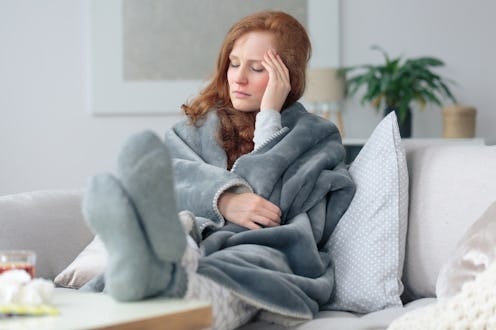Life
7 Interesting Things That Happen To Your Body When You're Recovering From Not Sleeping Well

Becoming sleep deprived is serious business. So much so, that when you begin to recover from sleep debt, your body will experience all sorts of bizarre changes. From fluctuations in hormone levels to visible changes on your face, recovering from a lack of sleep will affect you. Luckily, according to doctors, these changes are a good thing.
It's important not to undervalue how important it is to recover from sleep deprivation. "Unfortunately, sleep is often seen as unnecessary, something that can be skimped on in favor of productivity," Dr. Mairav Cohen-Zion, clinical psychologist and chief science officer at dayzz, tells Bustle. "To fall into a sleepless pattern, however, creates a sleep debt that must be repaid, even if the debt is longstanding, or you will face consequences you might not even be aware of." Your body can start to bounce back.
You may not realize, however, as you begin to sleep more and feel less tired, that your body is also recovering in a myriad of other ways. "You need a recovery period after a few nights of inadequate sleep because your body is trying to get your circadian rhythm back on track," Caleb Backe, a health and wellness expert at Maple Holistics, tells Bustle. "This directly affects a variety of functions, including regulating your body temperature, metabolism, and release of hormones. It also allows your cells to renew and consolidates long-term memory. Basically, by catching up on sleep you’re resetting your body to function at its best." So if you pay attention, you may actually be able to witness all sorts of changes.
Here are seven things that happen to your body when you're recovering from a lack of sleep, according to experts.
1Your Hormones Can Change
Stress isn't always created by your environment. Sometimes, it can come from inside your body. Cortisol, the body's stress hormone, fluctuates with how much sleep you get.
"There is a direct link between cortisol and melatonin, which is the hormone associated with sleep," Backe says. "As melatonin increases, cortisol decreases. This means that when you’re catching up on sleep your stress levels inevitably go down." So finding ways to catch up on sleep is particularly important if you're going through a stressful time at work or in your personal life.
2Your Inflammation Levels May Lower
Even your body's immune response can change when you start to repay sleep debt. This is largely through the body's changes in inflammation.
"Sleep helps to reduce inflammation, so when your body is recovering from a lack of sleep, inflammation in the body will reduce," Backe says. "This helps your body to function at its optimum." This may be tied to the other, general ways you feel better after getting more rest — like feeling less achey, and more alert.
3You'll Produce More Collagen
If you feel like you start to look a bit different, maybe better, after recovering from a lack of sleep, then you might be on to something.
"When you’re recovering from a lack of sleep your skin can actually improve," Backe says. "Collagen is restored in your body during sleep meaning that your body is producing more collagen than when you were sleep deprived." So the changes in your skin after getting more sleep may not be all in your head.
4Your Blood Pressure Can Lower
Even your body's most baseline functioning can be affected by sleep deprivation. So even if you aren't measuring your blood pressure often, it may be changing without your noticing.
"A lesser-known damaging side effect of sleep deprivation is raised blood pressure," certified pediatric sleep consultant Riki Taubenblat, tells Bustle. So getting your sleep back on track can help lower your blood pressure, even if this isn't something you often pay attention to.
5Your Face Can Start To Look Different
Beyond just the effects of restored collagen levels, sleep restoration can change your appearance in a myriad of different ways.
"Red, puffy eyes, dark under-eye circles and droopier skin can all be side effects of being tired," Dr. Samant Virk, a neurologist and founder of telehealth company, MediSprout, tells Bustle. So as you get more sleep, different facial features may change too.
6You May Notice Different Hunger Levels
It makes sense that appetite will fluctuate with the amount of sleep you get, since eating and sleeping are your body's two main ways of getting energy. Still, you may be surprised how apparent this is when you start catching up on sleep.
"A full night of sleep is believed to regulate hunger by suppressing the ghrelin hormone, which controls hunger and stimulates leptin, which controls appetite," Dr. Cohen-Zion says. There's nothing wrong with eating more if you need the extra energy, but if you notice a change in appetite after getting more sleep, science may help explain that.
7Your Body Chemistry Makes You More Alert
One of the most subtle things that happens when your body begins to catch up on sleep is a change in your body chemistry. And although the science is complicated, it basically goes like this (according to Harvard Health): your levels of a neurotransmitter called adenosine drop.
"When [...] your levels of circulating adenosine drop, [you become] more alert and able to function efficiently." Dr. Cohen-Zion says. So proper sleep means that you are able to achieve this level of alertness more routinely.
While it's important to try to maintain a healthy sleep schedule at all times, sometimes life gets in the way. When recovering from sleep deprivation, then, as difficult as it is, it can be reassuring to know all the ways — small and large — that your body is reseting itself to get back on track. Sleep affects almost all parts of your body and mind, not just energy levels.